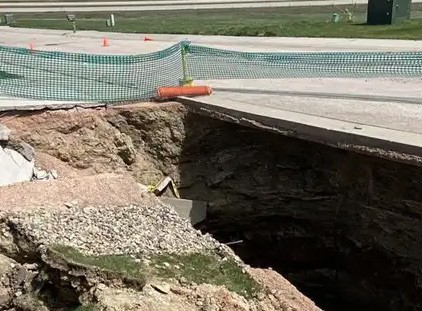Renewed drilling means huge costs for taxpayers

Musk oxen in the snow, Arctic National Wildlife Refuge, northeastern Alaska. U.S. Fish and Wildlife Service
BLACK HILLS – A Trump Administration means prosperity for the energy industry. Capitalists have been poised to reap the benefits of an upcoming boom fortified by even fewer regulations. The implications for the mineral-rich Black Hills in South Dakota are enormous.
South Dakotans typically line up to take advantage of these mining booms, but the recent election may show waning support for the boom-bust cycle that characterizes direct and indirect mining, as many voters, 60 percent, rejected Carbon Summit Solutions’ attempt to eliminate authority of local officials to create laws to protect communities from the risks of CO2 pipelines.
Dubbed the “Landowners Bill of Rights” by those in favor of eliminating local control, Senate Bill 201 provided protections and incentives for those impacted by the pipeline but instead of requiring pipeline companies to prove that regulations are unreasonable, it put the onus on local government to demonstrate to regulators why their restrictions on pipeline locations are unreasonable.
Governor Noem promoted SB 201 promising it would provide landowner protections, economic growth and would be transparent but she failed to relay to landowners how it also allowed the seizure of land through eminent domain, which even the South Dakota Supreme Court disagreed with as it denied Summit a rehearing and blocked the company from using eminent domain.
Ed Fischbach, a landowner impacted by the proposed Summit pipeline told Dakota Rural Action that Summit and its wealthy partners outspent South Dakotans by more than tenfold. “They thought they could buy the votes as easily as they bought the legislature. By defeating Referred Law 21, the voters have proven that we value people over profits. Hopefully this time the legislature will listen.”
Efforts to protect land and water from the impacts of mining will be made even more difficult if climate denier Kristi Noem is named to head the Department of Homeland Security. DHS, which oversees the Federal Emergency Management Agency, traditionally responds to disasters but also empowers communities to prevent them before they occur.
As a state legislator, a member of Congress and Governor, Noem does not have a history of empowering communities to prevent disasters before they occur. The June 2024 flooding is a perfect example of how years of climate denial and reduced emergency funding led to a lack of preparation. Emergency responders’ existing plans were proven to outdated and inadequate. There has been no preparation by state or local leaders to create mitigation plans and update building standards and regulations. South Dakota could better fund preparation and mitigation but has consistently spent more on recovery of natural disasters.
As head of the Department of Homeland Security, Noem would likely be focused on border policy. But she would also be tasked with overseeing the Nuclear Sector Risk Management Agency that is within the DHS. She would be tasked with helping the development of critical minerals.
Candidate Donald Trump promised he would open parts of Alaska’s Arctic National Wildlife Refuge (ANWAR) to drilling for “liquid gold.” Now that he has won the presidency, President Biden on Wednesday, moved to limit oil drilling there.
The Trump Administration passed a law that required the federal government to hold two lease sales for fossil fuel drilling. Because there was no interest by the oil industry, the first lease sale in 2021 was canceled. Trump’s Tax Cut and Jobs Act of 2017 mandates two lease sales offering at least 400,000 acres is to be held before the end of the year. The auction is the lowest that the Biden Administration could legally offer.
Trump has chosen New York congressman Lee Zeldin to head the Environmental Protection Agency. The EPA’s administrator is responsible for managing and enforcing the nation’s environmental laws and regulations and for preparing the annual budget for the agency. It leads the federal government’s efforts to protect the environment.
Zeldin is expected to swiftly deregulate to “unleash the power of American businesses,” according to Trump, while maintaining the highest of environmental standards.
Interest in restarting Three Mile Island Nuclear Power Plant and increasing the construction of new power plants has implications for uranium mining in the Black Hills and the surrounding area. The Department of Energy just announced that it plans to triple nuclear energy capacity by 2050. But a boom will lead to a bust and even more unregulated mining in the Black Hills means more costs to taxpayers on the back end. Taxpayers pay for clean-up with their pocketbooks and their health.
Hideaway Hills homeowners are still embroiled in a lawsuit to hold someone accountable for the disaster that has engulfed residents, leaving them with devalued homes after a portion of the mine collapsed.
Attorneys representing the residents in that class action lawsuit have recently filed a notice to appeal two significant court decisions:
The Circuit Court’s denial of a partial motion for summary judgment. This motion was related to determining whether the State had taken property in Hideaway Hills. The lawyers are challenging the court’s decision not to rule in their favor on this matter.
Also, the Court’s order granting the State’s motion to dismiss. This order was based on the question of whether the State has sovereign immunity against claims from Hideaway Hills residents. The lawyers are appealing this decision, which effectively shields the State from certain legal actions.
This move could potentially lead to a reassessment of the State’s responsibility and liability in the Hideaway Hills case. The outcome of these appeals could have significant implications for the residents of Hideaway Hills and their ability to seek compensation or resolution for issues related to their property. It also highlights the complex legal questions surrounding government responsibility and immunity in such cases.
It is expected that efforts to protect Rapid City drinking water by withdrawing 20,574 acres of National Forest Land will be approved before the end of the year by the Secretary of the Interior.
(Contact Marnie Cook at cookm8715@gmail.com)
The post Renewed drilling means huge costs for taxpayers first appeared on Native Sun News Today.
Tags: Top News

